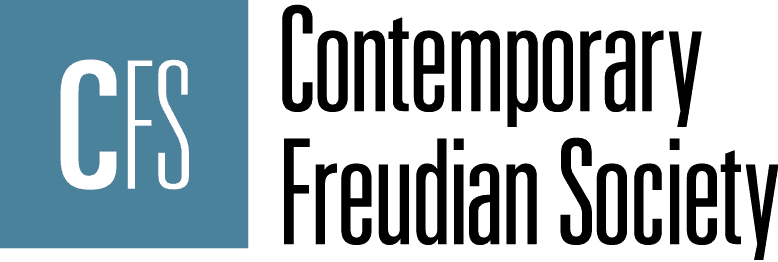
THE CFS by Paula Ellman
The Contemporary Freudian Society is one of the largest IPA Independent Psychoanalytic Societies and is flourishing with active membership in both New York and Washington, DC. Our name reflects our commitment to integrating contemporary developments in theoretical and technical aspects of psychoanalytic thinking, combined with respect and appreciation for our historical roots. We currently have over 200 members, approximately one third in DC, and two thirds in NY, with almost 70 candidates currently in training. (Please visit our new website:
https://contemporaryfreudiansociety.org/)
We offer an Integrated Training program in Adult, Adolescent and Child Psychoanalysis; a NY State License Qualifying Program in Psychoanalysis; a Psychoanalytic Psychotherapy Program offering two-year training in psychotherapy; and an affiliation with the Anni Bergman Parent-Infant Training Program jointly with IPTAR. In addition, we offer a Fellowship Program in Washington, DC. The CFS is approved by the United States Department of Homeland Security to provide training to non-immigrant international students (SEVIS).
The creativity and industriousness of our membership has brought us both active involvement in the IPA, in committee contributions and service as IPA officers, along with the development of projects devoted to community and to psychoanalysis. CFS was the leading edge (2007) in the ground-breaking and continuing trend to change training analyst standards to be non-evaluative making a long-needed crucial dent in the “caste” system of psychoanalysis. In addition, following in the wake of the IPA decision to allow three-times-a-week psychoanalysis, CFS voted to include this lesser frequency of treatment as eligible to constitute one of the required training cases for graduation.
This past year, like all, we have been challenged with the need for distance-training and have held robust classes both in New York and in Washington, DC, so our institute remains continuously active and engaged. We invite you to view two videos here that feature founding members of CFS.

 Click on images above to watch the videos
Sheldon Bach
Our Curriculum
Click on images above to watch the videos
Sheldon Bach
Our Curriculum was revised in 2006, positioning analytic listening as its cornerstone. Learning psychoanalytic technique should include exposure not only to psychoanalytic readings but also must be centered in the clinical encounters understood through the presentation of process material from analyses conducted by analysts who have graduated from the program. Nancy Wolf, member of the curriculum committee offers: “The idea in this new curriculum was that the candidates should learn, think, and play in the field of psychoanalytic concepts linked to clinical material so as to become familiar with these concepts before grappling with the abstraction of theory, lest theory constrain learning or inhibit intuition or freeze freedom of clinical response.” A central task of psychoanalytic training is to help candidates recognize their emotional responses to clinical material that provides a foundation for the registration of and work with countertransference and transference experience.
The “key concepts” central and indispensable to psychoanalysis provide an earpiece and amplifier for listening and serve as scaffolding for the future understanding of theory. The curriculum committee understood this process of introducing concepts and revisiting them in different contexts and within different theoretical perspectives as a valuable part of the learning, naming this “spiral learning”.
The study of development throughout the life cycle has also been foundational in our training and was instrumental in developing our approach to Integrated Training, a curriculum that includes courses and clinical supervision such that our candidates are trained in both adult and/or child analytic work. Each candidate selects their emphasis. In 2017, the IPA approved CFS as an Integrated Curriculum Institute.
Our curriculum recognizes the value of infant observation, the contributions of attachment theory, and the relevance of neurological findings to psychoanalytic thinking and work. We emphasize how understanding infantile experience impacts the understanding of later life issues in psychoanalysis. The first two years of training are structured so that the development sequence intersects with the material in the Analytic Listening and Concepts courses and again in the Diagnostic Thinking courses of the second year. This curriculum is thus well situated in terms of its focus on the relation of infancy, childhood and adolescence to psychological functioning in adults and to the integration of child and adult analytic study.
Task force work has continually updated our curriculum, with current active work at bringing an emphasis on diversity in race and gender in our curricula in both NY and DC Institutes. The launching and sustaining of numerous programs has been of great importance to the CFS. Historically, the CFS has brought a focus to the Community even pre-dating the cruciality of community work stirred by the pandemic.
We offer a two-year psychotherapy training program, that with the pandemic, includes students who live at a distance with our use of a video conference platform. The CFS also offers a year-long fellowship program for mental health trainees and professionals wishing to explore psychoanalytic thinking.
The Anni Bergman Parent-Infant Program
Firmly based in psychoanalytic principles, the Anni Bergman Parent-Infant Program (
https://www.abpip.net) was founded in 1997 at the Contemporary Freudian Society and in 2005 became co-sponsored by The Institute for Psychoanalytic Training and Research. ABPIP is comprised of training, outreach, and research components:
There are three options in the training component: 1) The Three-Year Training Program in Parent-Infant Studies provides training to psychoanalysts and advanced psychoanalytic candidates, 2) The One-Year Infant Observation Seminar provides training to psychoanalytic candidates and other clinicians nationally and internationally, via Zoom, and 3) The Seven-Week Introductory Infant Observation Seminar provides training using video vignettes from a recorded infant observation to psychoanalytic candidates and other clinicians via Zoom.
The Home-Visiting Project is the outreach component providing parent-infant psychotherapy to mothers, fathers and babies living in homeless shelters and other temporary housing, and to parents and children under the age of three who are in the process of reunification after separation into the foster care system.
Listen here to an interview with Rita Reiswig and Sally Moscowitz, current Co-Directors of the program.
The SPRING Project (
https://springproject.org) is an outreach initiative sponsored by CFS. The Project focuses on women and families contending with perinatal mood adjustment. Launched in 2017, the Project is comprised of CFS psychoanalysts, as well as psychoanalysts and psychodynamic therapists affiliated with other organizations in the Washington, DC and New York metropolitan areas. Elizabeth Fritsch, a past president of the CFS, directs the Project. The Project aims to help women access affordable therapy and has created a dedicated professional community engaged in study and information sharing. The Project has developed strong linkages with medical providers helping pregnant and postpartum women.
The Plumsock Prize, established in 1990, is designed to encourage writing on psychoanalytic subjects. One commonality is that the Plumsock winners each move psychoanalysis forward in development. Each paper, written at a certain moment in time, closely considers clinical process, and develops new ways of thinking analytically about this process.
A number of Plumsock Prize-winning papers were included in a recent publication, entitled The Plumsock Papers: Giving New Analysts a Voice, edited by Paula Ellman and Kimberly Kleinman and published with IPBooks.
This year’s Plumsock winning paper, written by Susan Siegeltuch, described the work she did at the border with undocumented asylum seekers, accompanied by Dr. Gilbert Kliman, an Honorary CFS member. They conducted a forensic evaluation of a Central American mother and her teenage suicidal daughter, with psychoanalytically-informed thinking, awareness of transference and countertransference and empathic and humane listening.
This first-hand account of an asylum seeker and her daughter is a tribute to this mother's resilience and the power of attachment and demonstrates the contribution psychoanalysts can make outside the office.
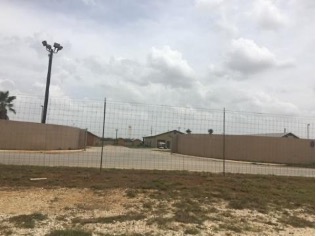 Barbed Wire Fences and Border Walls by Susan Siegeltuch
Our History
Barbed Wire Fences and Border Walls by Susan Siegeltuch
Our History
The Contemporary Freudian Society (CFS), formerly the New York Freudian Society, is a not-for-profit membership organization founded in 1959, and incorporated under New York State law. Gisela S. Barinbaum, born in Vienna, founded the Freudian Society with a small group of analysts. Like several other New York training institutes, the society was formed by members who split from the National Psychological Association for Psychoanalysis (NPAP), founded by Theodor Reik in 1948. Membership and candidates grew steadily with the addition of analysts from the National Psychological Association for Psychoanalysis, the New York University Postdoctoral Program in Psychoanalysis and Psychotherapy, and analysts who had "bootleg" training, often by members of the New York Psychoanalytic Society. Barinbaum died in 1981, but her influence by that time had become insignificant.
A lawsuit on trade restriction brought by members of the American Psychological Association against the American Psychoanalytic Association and the International Psychoanalytical Association, proved beneficial to the New York Freudian Society. The settlement permitted societies to apply to the International Psychoanalytical Association. Site visits by the association followed from 1987 to 1989, and the New York Freudian Society became a provisional member of the association in Rome in 1989 and a component society of the association in Amsterdam in 1993.
 1989 IPA Congress in Rome (From left: Mark and Ruth Grunes,
1989 IPA Congress in Rome (From left: Mark and Ruth Grunes,
Stanley and Carol Grand, and William and Inez Greenstadt
The Confederation of Independent Psychoanalytic Societies (CIPS), of which the CFS is a member, currently includes six independent American IPA societies.
From 2009-2012, many participated in a steady process of discussion around name change, leading to a vote to change our name from The New York Freudian Society to The Contemporary Freudian Society. A name better representing our identity as an organization with membership spanning the eastern seaboard with a diversity of theoretical and technical approaches - yet preserving our common Freudian heritage.
(
Thank you to Batya Monder and Andrea Greenman for this history)
Washington, DC Division
The
DC Division, established in 1985, was initiated by a group of psychologists in the Washington, DC area seeking to train to become psychoanalysts. At that due to restrictions on who was permitted to become a psychoanalyst, there were no programs in the DC area to train psychologists.
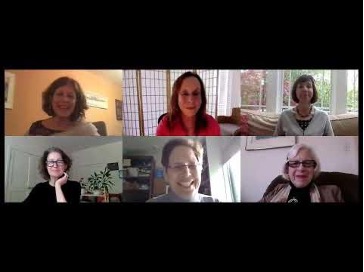 Click on image above to watch video
Click on image above to watch video
CFS DC Division Founding Members (Paula Ellman,
Nancy Goodman, Elizabeth Fritsch, Shelley Rockwell,
Harriet Basseches, and Fonya Helm)
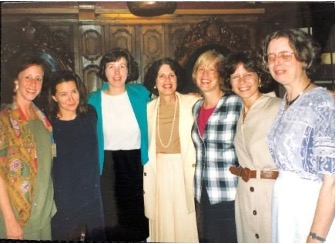
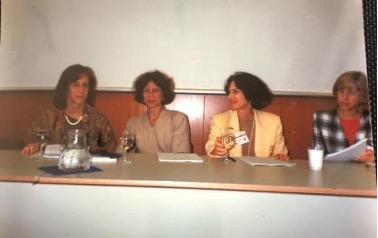
Over the past 34 years, we have evolved into a 49-member organization, primarily based in the DC and Baltimore region, but with weekend classes, allowing for membership from colleagues at a distance (such as Miami, Norfolk, Charlottesville and Virginia Beach). Recently, we instituted an Academic Associates Program enabling both clinicians and non-clinicians to join analytic candidates in their first two years of classes after which a decision about applying for candidacy can be made. The membership is comprised of a theoretically diverse group of analysts, who have contributed books and papers to the field, including theoretical and clinical presentations at national and international analytic conferences on such topics as the witnessing of trauma, the analyst in mourning, contemporary conceptualizations of perversity, impingement on the analytic container and psychoanalytic work with people on the autism spectrum.
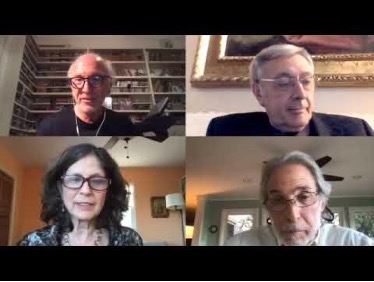 Click on image above to watch video
Click on image above to watch video
Preview of 2021 IPA Congress (Paula Ellman, Nancy Goodman,
Douglas Chavis, Stefano Bolognini, and Abel Fainstein)
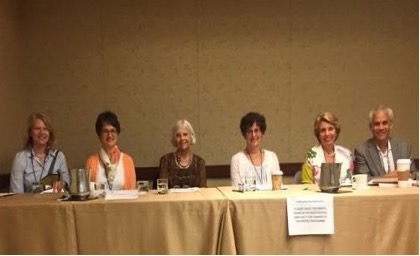
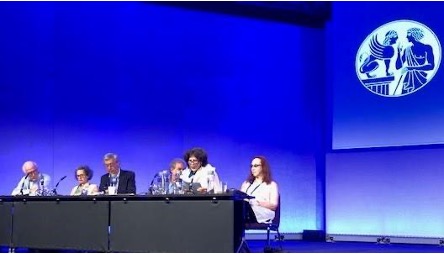 2015 IPA Congress in Boston (Justine Kalas Reeves, Jessica Brown, Debra Neumann, Janet Shaye, Marie Murphy, and Michael Krass]
2015 IPA Congress in Boston (Justine Kalas Reeves, Jessica Brown, Debra Neumann, Janet Shaye, Marie Murphy, and Michael Krass]
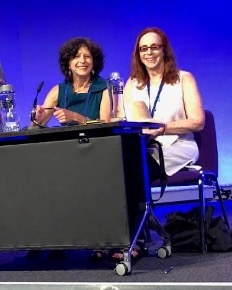
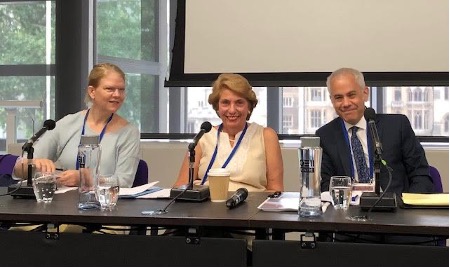 2019 IPA Congress in London
2019 IPA Congress in London
(Paula Ellman and Nancy Goodman)
Some Members from both NY and DC have travelled regularly to Wuhan, China for the past ten years to train hundreds of Chinese mental health professionals with translators in the Sino-American Continuing Training Project for Wuhan Hospital for Psychotherapy, initiated by Arlene Kramer Richards with China colleague TongJun (Wuhan).
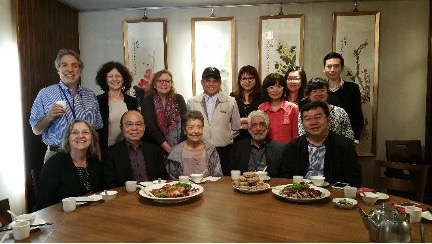 Arlene Kramer Richards, Arnold Richards, Paula Ellman, and Kim Kleinman with Taiwan colleagues - Taipei
Arlene Kramer Richards, Arnold Richards, Paula Ellman, and Kim Kleinman with Taiwan colleagues - Taipei
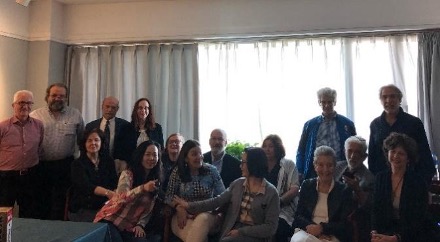 Arlene Kramer Richards, Arnold Richards, Paula Ellman, Kim Kleinman, and Nancy Goodman with American and Chinese colleagues – Wuhan
Arlene Kramer Richards, Arnold Richards, Paula Ellman, Kim Kleinman, and Nancy Goodman with American and Chinese colleagues – Wuhan
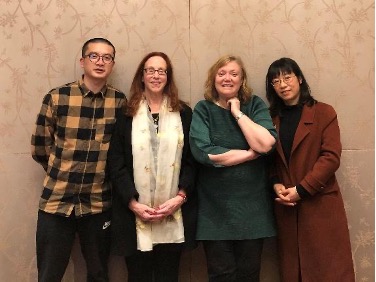
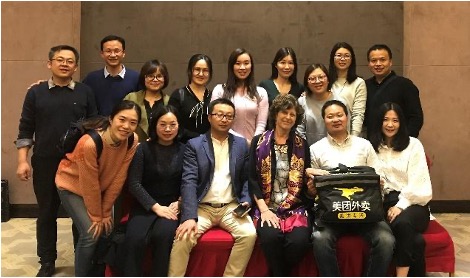 Nancy Goodman and Kim Kleinman with Chinese
Nancy Goodman and Kim Kleinman with Chinese
Colleagues -Wuhan
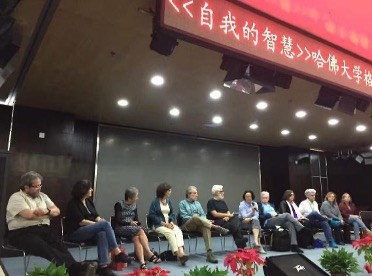 American Faculty at Wuhan training program (Arlene
American Faculty at Wuhan training program (Arlene
Kramer Richards, Arnold Richards, Paula Ellman, and
Kim Kleinman)
 Arlene Kramer Richards and Arnold Richards with Chinese students - Wuhan
Arlene Kramer Richards and Arnold Richards with Chinese students - Wuhan
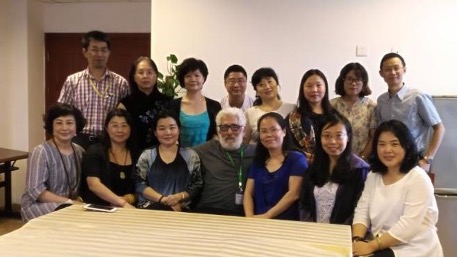
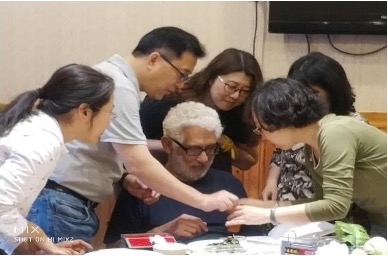 Arnold Richards with his Chinese students - Wuhan
Arnold Richards with his Chinese students - Wuhan
Currently the CFS is engaged in recognizing issues of diversity as among the CFS’s most pressing concerns. To move forward, we have to grapple with the historical limitations in psychoanalytic thinking and training that adapted us to understand and treat the affluent white class, but less well equipped to understand a racially, sexually, gender and socio-economically diverse population. We have established a reorganized Diversity Committee that offers conferences and study groups for members and candidates. Most importantly, offerings of faculty enrichment sessions to become familiar with the most current theoretical and clinical ways of thinking on racism and prejudices, and gender diversities have been instituted. Further considerations on developing a community psychoanalysis model is underway. Also being considered is the question of distance training. We have experienced the feasibility of “remote” work during the pandemic and know that many in remote regions would not have access to psychoanalytic training otherwise.